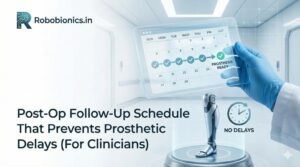
Post-Op Follow-Up Schedule That Prevents Prosthetic Delays (For Clinicians)
For many clinicians, the surgery is only the first step. What happens after the operation

Indore is a city that thrives on energy. From its food streets to its growing industries, it is a place where people are always on the move. But for someone who has lost a hand or a leg, that movement can suddenly stop. Life feels slower, harder, and filled with small struggles most people never notice.
This is where prosthetic fittings in Indore are making a difference. Local centers are not only providing artificial limbs but also offering new ways to make the journey easier. Trial days give patients time to test and adapt before making a decision. Easy EMIs remove the stress of paying all at once. And structured follow-up protocols ensure long-term comfort and success.
For the people of Indore, this mix of support and innovation is bringing prosthetics closer than ever. It is no longer just about fitting a device; it is about making sure it truly works in daily life, over time, and within a budget.

When someone loses a limb, the thought of wearing a prosthetic feels both exciting and overwhelming. A prosthetic is not like a pair of shoes that you can simply pick, wear, and walk away with. It is a device that becomes part of the body, and that takes time.
Trial days are designed for this reason. In Indore, many prosthetic centers now give patients the chance to test a prosthetic before fully committing. These trial sessions allow them to feel how the device works, understand the weight, and practice movements in a safe environment.
A big challenge for patients is fear—fear of discomfort, fear of looking unnatural, or fear of not being able to adapt. Trial days help break these fears step by step. By wearing the prosthetic for short periods, patients learn that the device is not a burden but a support.
This confidence is critical. Without it, many people abandon their prosthetics early, leaving them unused in cupboards. Trial days reduce this risk by making the journey smoother and more practical.
In most Indore centers, the first trial starts with simple fittings. The prosthetist checks measurements, adjusts straps, and ensures comfort. Patients then try basic activities like standing, walking a few steps, or gripping objects.
Over the next few days, they gradually test the prosthetic in real-life situations. A student might try writing or using a computer. A shopkeeper might practice handling money. A worker might attempt lifting light tools. These activities show whether the prosthetic is truly suited for the person’s lifestyle.
For many, the first time they wear a prosthetic feels strange. The weight, the alignment, and even the sound of moving joints can feel unusual. Trial days give patients time to get used to these sensations without pressure.
Trust builds slowly. As each task becomes easier, the patient begins to see the prosthetic as part of their body, not just a machine attached to it. This psychological shift is as important as the physical one.
During trial days, the presence of trained staff makes a huge difference. Prosthetists and therapists in Indore guide patients patiently, showing them how to adjust straps, balance weight, and control movements.
Family members are often invited to watch or even take part. Their encouragement helps the patient feel less alone. This team approach ensures that the trial is not just about fitting a limb, but about fitting confidence back into life.
It is natural to face hurdles during trial days. Some patients struggle with skin irritation. Others find it hard to balance at first. Many feel frustrated when simple tasks take longer than expected.
In Indore’s centers, these challenges are addressed step by step. Adjustments are made to the prosthetic, exercises are recommended, and counseling is provided when needed. The focus is not on rushing the process but on making sure the patient feels comfortable and ready.
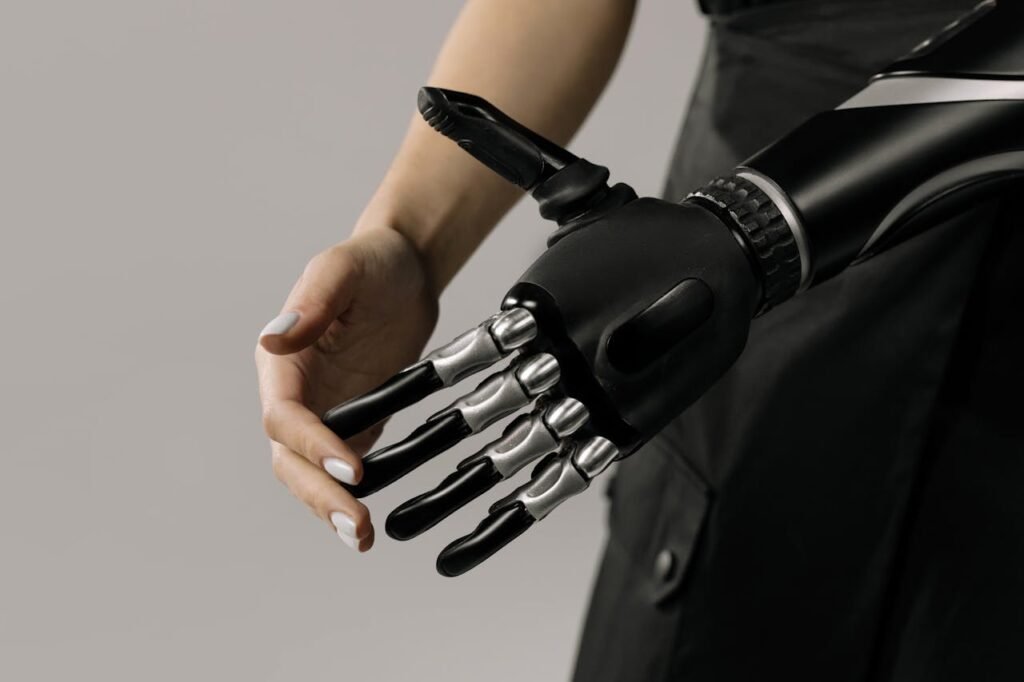
For a factory worker or mechanic in Indore, strength and durability are key. Trial days allow them to test whether the prosthetic can handle the demands of their work. Can it hold a tool firmly? Can it withstand long hours? These tests are critical before making a final choice.
For students, trial days are about precision. Writing, typing, using smartphones, and carrying books are daily needs. Trial sessions help them check if the prosthetic can support these fine movements without strain.
Young professionals, especially in IT and service sectors, also benefit. They can try real work scenarios during trial days, ensuring that when they return to the office, they are ready and confident.
Older patients often have concerns about comfort and safety. Trial days allow them to test whether they can walk steadily, climb stairs, or manage daily activities without risk. The sessions also help them decide whether they prefer lightweight devices or more supportive ones.
In Indore, no two trial days are alike. Each patient receives a personalized plan depending on their age, work, and goals. A young athlete will have a different trial process compared to a retired teacher.
This personalization makes the sessions more relevant and effective. Instead of generic activities, patients practice the very tasks they want to return to in life.
Prosthetic centers in Indore often work closely with rehabilitation experts. These therapists teach exercises that strengthen muscles, improve posture, and make prosthetic use easier. This collaboration ensures that trial days are not just about testing the device but also preparing the body to use it.
Trial days are a learning process for both patients and prosthetists. Feedback is taken after every session—about comfort, fit, and ease of use. Based on this feedback, adjustments are made to improve the prosthetic.
This back-and-forth ensures that by the end of the trial, the patient has a device that feels truly theirs. It is not just a generic product but a personalized solution.
For many families in Indore, the biggest hurdle in getting a prosthetic is cost. Even though locally made devices are more affordable than imports, the price can still feel heavy for households that rely on monthly wages.
A prosthetic hand or leg often costs anywhere between two to three lakh rupees if it is advanced. Paying this all at once is not possible for most families. This financial burden has stopped many patients from even considering a prosthetic, leaving them dependent on others.
To solve this, many prosthetic centers in Indore now provide easy monthly installments, or EMIs. Instead of paying the full amount upfront, patients can break the cost into smaller payments spread over months or even years.
This system removes the fear of a big one-time expense. Families feel more comfortable when they can manage the cost alongside other household expenses. It also ensures that prosthetics are no longer seen as luxury items but as practical healthcare solutions.
The process is simple. A patient chooses the prosthetic they need, whether mechanical or bionic. The total cost is then divided into smaller payments. Depending on the provider, these installments may be interest-free or come with very minimal charges.
In some cases, banks and NBFCs (non-banking financial companies) partner with prosthetic centers to provide EMI financing. This creates more flexibility and gives patients multiple repayment options.
Money worries often prevent families from seeking timely care. With EMI plans, that stress is reduced. Instead of delaying treatment for years, patients in Indore can get their prosthetic immediately and start using it while making payments gradually.
This means a worker can return to their job sooner, or a student can continue studies without a long gap. Families no longer need to choose between financial survival and medical care.
Without EMIs, many people would settle for basic prosthetics, even if they needed more advanced ones. With EMI support, patients can aim higher. They can choose bionic hands with multiple grip modes, or lightweight legs that allow smoother walking.
This choice matters because it directly affects quality of life. An advanced prosthetic may allow someone to continue their profession with greater ease, which in turn helps them earn more and repay the EMI without difficulty.
When patients invest in prosthetics through EMIs, they also invest emotionally. They commit to using the device fully, maintaining it well, and attending follow-ups. This commitment improves long-term outcomes, ensuring the prosthetic becomes a real part of their life.
Some centers in Indore provide zero-cost EMI options. This means the patient only pays the actual price of the prosthetic in smaller parts, without any extra charges. These schemes are usually supported by banks or NGOs that absorb the interest.
Zero-cost EMIs are especially helpful for low-income families, as they remove the fear of hidden costs. Patients can focus entirely on recovery without worrying about financial strain.
Other centers allow flexibility in repayment. Some patients prefer shorter repayment periods of 6 to 12 months, while others opt for longer tenures of 24 to 36 months. The choice depends on family income and comfort.
This flexibility ensures that EMIs do not feel like a burden. Families can select a plan that matches their monthly earnings, making it sustainable in the long run.
A growing trend in Indore is combining Ayushman Bharat coverage, private insurance, and EMI options. If insurance pays part of the cost, the remaining amount can be converted into EMIs.
This hybrid approach makes even advanced prosthetics realistic for middle-class families. Instead of being blocked by high costs, they get access to world-class technology at manageable monthly rates.
Ravi, a shopkeeper from Indore, lost his leg in a road accident. He wanted a lightweight prosthetic that would allow him to stand for long hours in his shop. The cost was higher than what his family could pay upfront.
Through an EMI plan offered by the prosthetic center, Ravi was able to take home the device immediately. He resumed work within weeks and used his shop income to make monthly payments. For him, EMI was not just financial support—it was a lifeline to independence.
Meera, a student at Devi Ahilya University, lost her hand due to a medical condition. She needed a bionic hand to continue her studies comfortably. Her parents could not afford the entire cost at once.
With a two-year EMI plan, Meera got her prosthetic fitted without delay. She continues her studies without interruption, and her parents manage payments alongside other household expenses. This option saved her academic year and gave her the confidence to move forward.
Shankar, a construction worker, lost his hand in an accident. For him, a prosthetic meant being able to work again and earn for his family. The idea of paying lakhs upfront was impossible.
With EMI support, Shankar was fitted with a mechanical hand suited to his work. His income slowly recovered, and the EMIs were managed easily within his monthly earnings. For him, the prosthetic was not just a device but the key to survival.
Prosthetic centers in Indore run awareness programs to inform families about EMI options. Many people still think prosthetics are only for the wealthy. When they learn about installment plans, they realize that modern prosthetics are within reach.
These awareness programs are run in hospitals, community halls, and even rural camps. By showing real-life examples, they build trust among families who are hesitant.
Many prosthetic providers in Indore collaborate with local banks to simplify financing. Banks see this as a social responsibility, helping families afford life-changing devices. For patients, it means fewer hurdles in paperwork and faster approvals.
Some providers now use digital platforms to explain EMI options clearly. Patients can calculate monthly installments online, compare plans, and choose what works best. This transparency builds confidence and removes fear of hidden costs.

When a family chooses an EMI plan, they no longer carry the weight of arranging a lump sum. This freedom allows them to focus on the patient’s recovery instead of constant financial stress.
The relief is often visible. Families walk into the fitting center with heavy hearts but leave with smiles, knowing that the cost will not crush them.
For patients, EMIs are not just about money. They are about hope. They prove that no one is too poor to dream of walking again, holding a pen, or working with both hands. The possibility of paying in small steps gives patients the courage to step forward.
EMI options also bring equality. They ensure that advanced prosthetics are not limited to the wealthy. In Indore, shopkeepers, students, farmers, and workers are all accessing the same technology because of flexible payments. This inclusivity builds a stronger, fairer community.
Fitting a prosthetic is not the end of the journey. It is just the beginning. The real test comes when the patient uses the device every day—walking, working, cooking, or writing. Small issues often appear after weeks or months of use.
This is why follow-up protocols are so important. In Indore, prosthetic centers have developed structured follow-up systems to ensure patients continue to use their devices comfortably and safely. Without this support, many prosthetics end up unused because of pain, poor fit, or lack of guidance.
The first goal of a follow-up is to check comfort. Even if a prosthetic feels fine during trial days, long-term use may reveal pressure points or skin irritation. Follow-up visits allow adjustments to be made before these problems become serious.
Fit is another key factor. As the body adapts, muscle strength may change. A socket that felt snug in the beginning may become loose or tight later. Regular reviews ensure that the prosthetic always feels natural.
Follow-ups also look at how well the prosthetic works in real-life conditions. Is the patient able to perform job tasks? Can they manage at home without help? Are they facing difficulties with certain movements?
By observing and asking these questions, prosthetists in Indore fine-tune the device to match the patient’s lifestyle. This practical approach prevents frustration and builds long-term success.
Most Indore prosthetic centers schedule the first follow-up within two to three weeks of fitting. This early check ensures that any immediate problems are solved quickly. Patients are encouraged to share even the smallest discomforts so adjustments can be made.
The focus at this stage is reassurance. Patients often feel nervous, and knowing that experts are still guiding them builds trust.
After the initial phase, patients are usually called back once a month or once every three months. These visits allow the prosthetist to see how the device is performing under regular use.
For children, more frequent visits may be needed since their bodies grow and change faster. For adults, quarterly reviews often work well unless there are specific concerns.
Once patients are comfortable and confident, follow-ups shift to long-term reviews—often once or twice a year. These visits focus on maintenance, upgrades, and checking whether the device still matches the patient’s needs.
Long-term reviews are also opportunities to introduce new technologies. If a patient has been using a mechanical hand for years, they may be guided towards trying a bionic hand when ready.
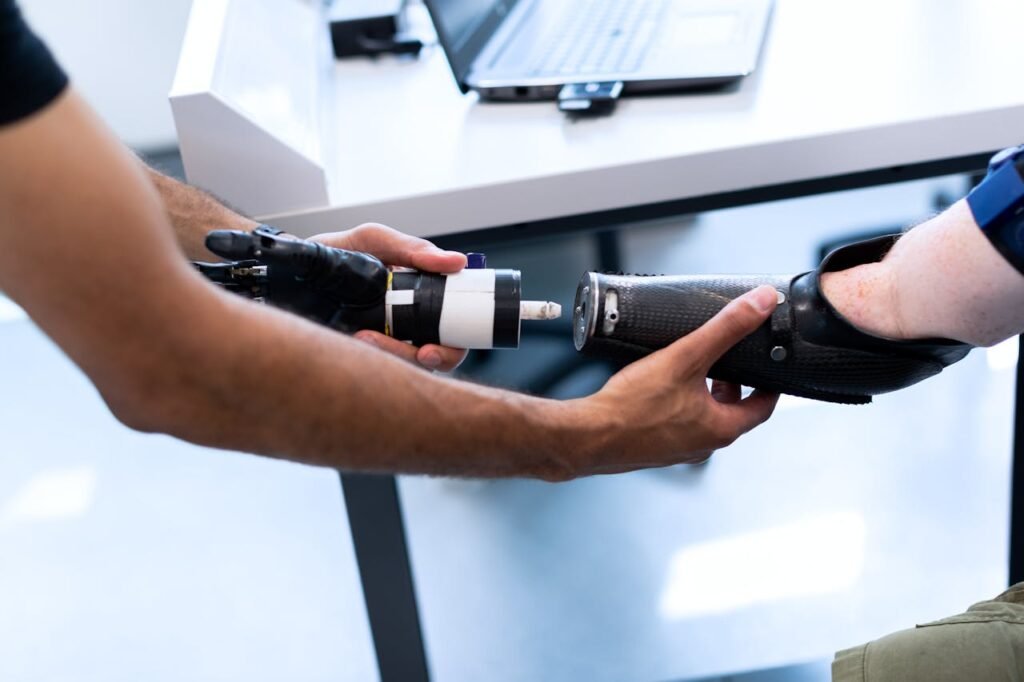
Follow-ups are not just about technical adjustments. They also include continuous training. Patients are taught new ways to use their prosthetics more effectively. For example, a worker may learn how to grip tools more securely, or a student may learn typing shortcuts with a bionic hand.
This ongoing training makes the prosthetic more valuable over time, ensuring it adapts to the patient’s growing needs.
Many follow-up protocols in Indore include physiotherapy sessions. These strengthen muscles, improve balance, and reduce strain. Without therapy, patients may develop bad postures or rely too much on their natural limb, reducing the effectiveness of the prosthetic.
By integrating therapy, follow-ups ensure that the body and device work together smoothly.
Limb loss affects more than the body—it affects the mind too. Many patients go through emotional ups and downs even after being fitted with a prosthetic.
Follow-up sessions often include counseling support, either through trained staff or partner organizations. Patients are encouraged to share their struggles, meet others with similar experiences, and find motivation to keep moving forward.
Ritu, a teacher from Indore, was fitted with a bionic hand. During her first follow-up, she complained about wrist fatigue while writing on the blackboard. The prosthetist adjusted the settings to reduce strain and taught her new ways of holding chalk.
By the second follow-up, Ritu was teaching without discomfort. The structured protocol allowed her to return to her classroom confidently, without fearing pain or failure.
Sohan, a factory worker, initially struggled with his mechanical hand. He found it hard to grip heavy tools for long hours. During follow-ups, the prosthetist tested different attachments and reinforced his device.
Now, Sohan can complete his shifts with fewer breaks. Without regular reviews, he might have abandoned the prosthetic altogether. Instead, the follow-up process turned frustration into success.
A young boy named Aarav received a leg prosthesis in Indore. Since children grow quickly, his parents were guided into a follow-up schedule every three months. Each visit involved resizing and adjustments to match his growth.
This careful monitoring ensured that Aarav could continue playing, studying, and living like other children without interruption. His parents say the follow-up protocol gave them peace of mind and hope for his future.
Globally, one of the biggest problems in prosthetics is device abandonment. Patients often stop using their prosthetics because of discomfort or lack of guidance. In Indore, structured follow-ups have reduced this problem.
By addressing issues early and offering continuous support, prosthetists make sure that patients stay engaged with their devices.
Regular reviews also save money in the long run. Small adjustments prevent bigger problems that would require expensive repairs or replacements. Patients who follow scheduled protocols usually spend less overall.
This financial benefit is especially important for families in Indore managing their budgets carefully.
Follow-up protocols also strengthen the bond between patients and prosthetists. Instead of a one-time service, the relationship becomes long-term and supportive. Patients feel cared for, and providers build trust within the community.
This bond creates a cycle of positive word of mouth, encouraging more people in Indore to seek prosthetic services confidently.
Indore’s prosthetic centers are exploring digital tools for follow-ups. Video calls, mobile apps, and online tracking are being tested to reduce the need for frequent hospital visits. Patients can share videos of their daily activities, and prosthetists can suggest adjustments remotely.
This blend of physical and digital care makes follow-ups easier, especially for those living outside the city.
Peer support groups are also being introduced. Patients meet others with prosthetics, share challenges, and learn tips. These groups reduce isolation and make rehabilitation more social and motivating.
Such community-driven models are likely to grow in Indore, making follow-ups not just medical check-ins but social gatherings of encouragement.
Follow-up care is now being linked with trial days and EMI plans. Patients who sign up for prosthetic services often receive a package that includes follow-up sessions for one or two years. This integration ensures continuity and long-term success.
For families, it means predictable care without worrying about hidden costs. For providers, it ensures better patient satisfaction.

For anyone in Indore considering a prosthetic, the process is not about one single step. It is about the entire journey—starting with trial days, moving through EMI options, and continuing with follow-up protocols.
Trial days give patients confidence. EMIs give them financial relief. Follow-up care ensures long-term success. Together, these three elements form a complete circle of support. Without one, the experience feels incomplete.
Imagine a patient named Prakash. He begins his prosthetic journey with trial days, where he tests different devices and chooses what feels right. Once he decides, he uses an EMI plan to manage the cost without overwhelming his family. Over the next months, he attends regular follow-ups, where his device is adjusted and his skills are improved.
Each step supports the next. If he had skipped trial days, he might not have chosen the right device. If EMI was not available, he might have delayed treatment. Without follow-ups, he could have abandoned the prosthetic due to discomfort.
This combined model is what makes Indore’s prosthetic services strong and reliable.
One of Indore’s strengths is inclusivity. Prosthetic centers here are not only serving wealthy patients but also middle-class families, students, daily wage workers, and farmers. Trial days, EMIs, and follow-ups make this possible by addressing different types of barriers—emotional, financial, and practical.
This inclusive model ensures that no one is left behind. Whether someone needs a simple mechanical hand or an advanced bionic device, there is a path available.
Indore’s central location in Madhya Pradesh makes it a natural hub for surrounding towns and villages. Patients from Ujjain, Dewas, Mhow, Khandwa, and beyond come here for prosthetic services. For them, the city provides opportunities they may not find locally.
The growth of prosthetic centers in Indore means fewer people need to travel to metros like Mumbai or Delhi. They can get world-class care closer to home, saving both money and time.
Much of this progress is possible because of strong partnerships. Prosthetic providers collaborate with hospitals, rehabilitation centers, banks, and NGOs. Each partner plays a role in making the system smoother.
Hospitals provide medical support. Banks enable EMI financing. NGOs spread awareness in rural areas. Prosthetic companies bring in technology and expertise. Together, they create a network that supports patients from start to finish.
Before trial days, many patients feel scared of prosthetics. They worry about discomfort or failure. With trial sessions, they slowly learn to trust the device. This transition from fear to confidence is the foundation of empowerment.
Without EMI options, prosthetics would remain out of reach for most families. By breaking costs into smaller payments, EMIs give families control over their finances. Instead of debt or sacrifice, they move forward with dignity.
Follow-up protocols ensure that patients are never left alone after fitting. With continuous adjustments, training, and counseling, they feel supported throughout their journey. This long-term connection gives them strength to keep using their prosthetics and living independently.
Sneha, a college student in Indore, received a bionic hand through a combination of trial days, EMI support, and follow-up protocols. During trial days, she tested writing and typing to ensure the device would work for her studies. With an EMI plan, her parents managed the cost without delay. Regular follow-ups helped her improve typing speed and adapt to daily tasks.
Today, she has graduated with confidence and is preparing for her career. Her journey shows how these three systems work seamlessly to support success.
Mohan, a farmer from a nearby village, lost his leg in a tractor accident. During trial days in Indore, he tested different leg prosthetics to find one suited for fieldwork. With EMI support, he took home the device immediately, paying in small installments. Follow-ups helped him adjust the fit for rough terrain and long hours of walking.
Now, Mohan is back in his fields, proving that agriculture and prosthetics can go hand in hand. His story is a reminder that support systems must fit real life, not just hospitals.
Deepak, an accountant, needed a prosthetic hand that could handle paperwork and typing. During trial sessions, he practiced with calculators and files. EMI options made the advanced bionic hand affordable. Through follow-ups, he fine-tuned grip modes for smooth office work.
He now continues his career without interruption. His case highlights how professional lives can be fully restored with the right support.
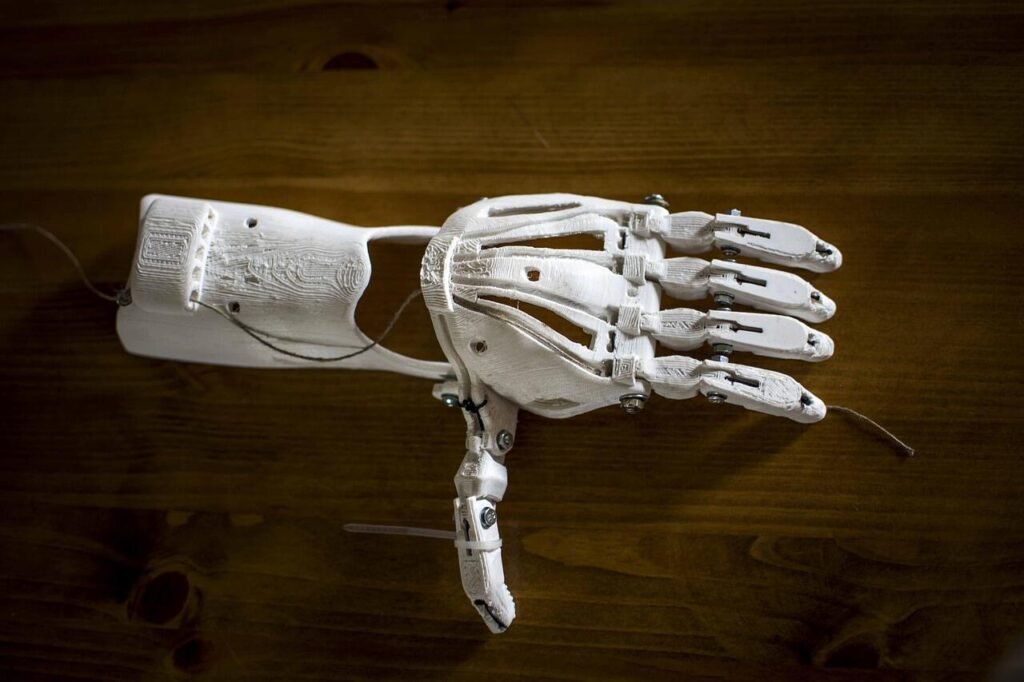
In the coming years, trial days may include virtual simulations where patients can preview how prosthetics will work in different tasks. EMI applications will likely move entirely online, with faster approvals and transparent terms. Follow-up care will increasingly use mobile apps and video calls, making support more convenient.
As awareness spreads, more people from rural Madhya Pradesh will travel to Indore for prosthetics. Mobile health camps and community programs will guide patients towards these services. Partnerships with local leaders will help reduce stigma and encourage acceptance.
Future models will not only make prosthetics affordable but also ensure that upgrades are within reach. As technology improves, patients in Indore will not be left behind. Insurance, EMIs, and government schemes will continue to make even advanced devices accessible.
Indore’s prosthetic care system is built on three strong pillars—trial days, EMIs, and follow-up protocols. Each plays a vital role in turning prosthetic fittings into life-changing journeys.
Trial days give patients the chance to test, adapt, and build confidence before committing. EMIs make advanced prosthetics affordable for families of all income levels. Follow-up protocols ensure that success is long-term, with ongoing support and adjustments.
Together, these systems create a circle of care that empowers patients in every stage of their journey. They transform prosthetics from devices into companions—tools that restore independence, dignity, and confidence.
Indore is not just fitting prosthetics. It is fitting people back into their lives, their jobs, and their communities. By combining compassion with practical systems, the city is becoming a hub of hope for Madhya Pradesh and beyond.
For anyone in Indore or nearby regions facing limb loss, the message is clear: support is here, solutions are real, and a new beginning is possible. With trial days to guide the start, EMIs to ease the cost, and follow-ups to secure the future, the path to independence has never been more accessible.

For many clinicians, the surgery is only the first step. What happens after the operation
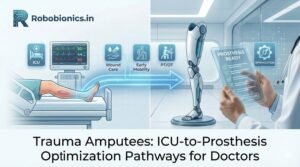
For trauma amputees, the journey does not begin at the prosthetic clinic. It begins much
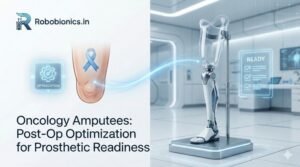
Amputation after cancer is not just a surgical event. It is the end of one

When a child loses a limb, the challenge is never only physical. A child’s body
Last updated: November 10, 2022
Thank you for shopping at Robo Bionics.
If, for any reason, You are not completely satisfied with a purchase We invite You to review our policy on refunds and returns.
The following terms are applicable for any products that You purchased with Us.
The words of which the initial letter is capitalized have meanings defined under the following conditions. The following definitions shall have the same meaning regardless of whether they appear in singular or in plural.
For the purposes of this Return and Refund Policy:
Company (referred to as either “the Company”, “Robo Bionics”, “We”, “Us” or “Our” in this Agreement) refers to Bionic Hope Private Limited, Pearl Haven, 1st Floor Kumbharwada, Manickpur Near St. Michael’s Church Vasai Road West, Palghar Maharashtra 401202.
Goods refer to the items offered for sale on the Website.
Orders mean a request by You to purchase Goods from Us.
Service refers to the Services Provided like Online Demo and Live Demo.
Website refers to Robo Bionics, accessible from https://robobionics.in
You means the individual accessing or using the Service, or the company, or other legal entity on behalf of which such individual is accessing or using the Service, as applicable.
You are entitled to cancel Your Service Bookings within 7 days without giving any reason for doing so, before completion of Delivery.
The deadline for cancelling a Service Booking is 7 days from the date on which You received the Confirmation of Service.
In order to exercise Your right of cancellation, You must inform Us of your decision by means of a clear statement. You can inform us of your decision by:
We will reimburse You no later than 7 days from the day on which We receive your request for cancellation, if above criteria is met. We will use the same means of payment as You used for the Service Booking, and You will not incur any fees for such reimbursement.
Please note in case you miss a Service Booking or Re-schedule the same we shall only entertain the request once.
In order for the Goods to be eligible for a return, please make sure that:
The following Goods cannot be returned:
We reserve the right to refuse returns of any merchandise that does not meet the above return conditions in our sole discretion.
Only regular priced Goods may be refunded by 50%. Unfortunately, Goods on sale cannot be refunded. This exclusion may not apply to You if it is not permitted by applicable law.
You are responsible for the cost and risk of returning the Goods to Us. You should send the Goods at the following:
We cannot be held responsible for Goods damaged or lost in return shipment. Therefore, We recommend an insured and trackable courier service. We are unable to issue a refund without actual receipt of the Goods or proof of received return delivery.
If you have any questions about our Returns and Refunds Policy, please contact us:
Last Updated on: 1st Jan 2021
These Terms and Conditions (“Terms”) govern Your access to and use of the website, platforms, applications, products and services (ively, the “Services”) offered by Robo Bionics® (a registered trademark of Bionic Hope Private Limited, also used as a trade name), a company incorporated under the Companies Act, 2013, having its Corporate office at Pearl Heaven Bungalow, 1st Floor, Manickpur, Kumbharwada, Vasai Road (West), Palghar – 401202, Maharashtra, India (“Company”, “We”, “Us” or “Our”). By accessing or using the Services, You (each a “User”) agree to be bound by these Terms and all applicable laws and regulations. If You do not agree with any part of these Terms, You must immediately discontinue use of the Services.
1.1 “Individual Consumer” means a natural person aged eighteen (18) years or above who registers to use Our products or Services following evaluation and prescription by a Rehabilitation Council of India (“RCI”)–registered Prosthetist.
1.2 “Entity Consumer” means a corporate organisation, nonprofit entity, CSR sponsor or other registered organisation that sponsors one or more Individual Consumers to use Our products or Services.
1.3 “Clinic” means an RCI-registered Prosthetics and Orthotics centre or Prosthetist that purchases products and Services from Us for fitment to Individual Consumers.
1.4 “Platform” means RehabConnect™, Our online marketplace by which Individual or Entity Consumers connect with Clinics in their chosen locations.
1.5 “Products” means Grippy® Bionic Hand, Grippy® Mech, BrawnBand™, WeightBand™, consumables, accessories and related hardware.
1.6 “Apps” means Our clinician-facing and end-user software applications supporting Product use and data collection.
1.7 “Impact Dashboard™” means the analytics interface provided to CSR, NGO, corporate and hospital sponsors.
1.8 “Services” includes all Products, Apps, the Platform and the Impact Dashboard.
2.1 Individual Consumers must be at least eighteen (18) years old and undergo evaluation and prescription by an RCI-registered Prosthetist prior to purchase or use of any Products or Services.
2.2 Entity Consumers must be duly registered under the laws of India and may sponsor one or more Individual Consumers.
2.3 Clinics must maintain valid RCI registration and comply with all applicable clinical and professional standards.
3.1 Robo Bionics acts solely as an intermediary connecting Users with Clinics via the Platform. We do not endorse or guarantee the quality, legality or outcomes of services rendered by any Clinic. Each Clinic is solely responsible for its professional services and compliance with applicable laws and regulations.
4.1 All content, trademarks, logos, designs and software on Our website, Apps and Platform are the exclusive property of Bionic Hope Private Limited or its licensors.
4.2 Subject to these Terms, We grant You a limited, non-exclusive, non-transferable, revocable license to use the Services for personal, non-commercial purposes.
4.3 You may not reproduce, modify, distribute, decompile, reverse engineer or create derivative works of any portion of the Services without Our prior written consent.
5.1 Limited Warranty. We warrant that Products will be free from workmanship defects under normal use as follows:
(a) Grippy™ Bionic Hand, BrawnBand® and WeightBand®: one (1) year from date of purchase, covering manufacturing defects only.
(b) Chargers and batteries: six (6) months from date of purchase.
(c) Grippy Mech™: three (3) months from date of purchase.
(d) Consumables (e.g., gloves, carry bags): no warranty.
5.2 Custom Sockets. Sockets fabricated by Clinics are covered only by the Clinic’s optional warranty and subject to physiological changes (e.g., stump volume, muscle sensitivity).
5.3 Exclusions. Warranty does not apply to damage caused by misuse, user negligence, unauthorised repairs, Acts of God, or failure to follow the Instruction Manual.
5.4 Claims. To claim warranty, You must register the Product online, provide proof of purchase, and follow the procedures set out in the Warranty Card.
5.5 Disclaimer. To the maximum extent permitted by law, all other warranties, express or implied, including merchantability and fitness for a particular purpose, are disclaimed.
6.1 We collect personal contact details, physiological evaluation data, body measurements, sensor calibration values, device usage statistics and warranty information (“User Data”).
6.2 User Data is stored on secure servers of our third-party service providers and transmitted via encrypted APIs.
6.3 By using the Services, You consent to collection, storage, processing and transfer of User Data within Our internal ecosystem and to third-party service providers for analytics, R&D and support.
6.4 We implement reasonable security measures and comply with the Information Technology Act, 2000, and Information Technology (Reasonable Security Practices and Procedures and Sensitive Personal Data or Information) Rules, 2011.
6.5 A separate Privacy Policy sets out detailed information on data processing, user rights, grievance redressal and cross-border transfers, which forms part of these Terms.
7.1 Pursuant to the Information Technology Rules, 2021, We have given the Charge of Grievance Officer to our QC Head:
- Address: Grievance Officer
- Email: support@robobionics.in
- Phone: +91-8668372127
7.2 All support tickets and grievances must be submitted exclusively via the Robo Bionics Customer Support portal at https://robobionics.freshdesk.com/.
7.3 We will acknowledge receipt of your ticket within twenty-four (24) working hours and endeavour to resolve or provide a substantive response within seventy-two (72) working hours, excluding weekends and public holidays.
8.1 Pricing. Product and Service pricing is as per quotations or purchase orders agreed in writing.
8.2 Payment. We offer (a) 100% advance payment with possible incentives or (b) stage-wise payment plans without incentives.
8.3 Refunds. No refunds, except pro-rata adjustment where an Individual Consumer is medically unfit to proceed or elects to withdraw mid-stage, in which case unused stage fees apply.
9.1 Users must follow instructions provided by RCI-registered professionals and the User Manual.
9.2 Users and Entity Consumers shall indemnify and hold Us harmless from all liabilities, claims, damages and expenses arising from misuse of the Products, failure to follow professional guidance, or violation of these Terms.
10.1 To the extent permitted by law, Our total liability for any claim arising out of or in connection with these Terms or the Services shall not exceed the aggregate amount paid by You to Us in the twelve (12) months preceding the claim.
10.2 We shall not be liable for any indirect, incidental, consequential or punitive damages, including loss of profit, data or goodwill.
11.1 Our Products are classified as “Rehabilitation Aids,” not medical devices for diagnostic purposes.
11.2 Manufactured under ISO 13485:2016 quality management and tested for electrical safety under IEC 60601-1 and IEC 60601-1-2.
11.3 Products shall only be used under prescription and supervision of RCI-registered Prosthetists, Physiotherapists or Occupational Therapists.
We do not host third-party content or hardware. Any third-party services integrated with Our Apps are subject to their own terms and privacy policies.
13.1 All intellectual property rights in the Services and User Data remain with Us or our licensors.
13.2 Users grant Us a perpetual, irrevocable, royalty-free licence to use anonymised usage data for analytics, product improvement and marketing.
14.1 We may amend these Terms at any time. Material changes shall be notified to registered Users at least thirty (30) days prior to the effective date, via email and website notice.
14.2 Continued use of the Services after the effective date constitutes acceptance of the revised Terms.
Neither party shall be liable for delay or failure to perform any obligation under these Terms due to causes beyond its reasonable control, including Acts of God, pandemics, strikes, war, terrorism or government regulations.
16.1 All disputes shall be referred to and finally resolved by arbitration under the Arbitration and Conciliation Act, 1996.
16.2 A sole arbitrator shall be appointed by Bionic Hope Private Limited or, failing agreement within thirty (30) days, by the Mumbai Centre for International Arbitration.
16.3 Seat of arbitration: Mumbai, India.
16.4 Governing law: Laws of India.
16.5 Courts at Mumbai have exclusive jurisdiction over any proceedings to enforce an arbitral award.
17.1 Severability. If any provision is held invalid or unenforceable, the remainder shall remain in full force.
17.2 Waiver. No waiver of any breach shall constitute a waiver of any subsequent breach of the same or any other provision.
17.3 Assignment. You may not assign your rights or obligations without Our prior written consent.
By accessing or using the Products and/or Services of Bionic Hope Private Limited, You acknowledge that You have read, understood and agree to be bound by these Terms and Conditions.